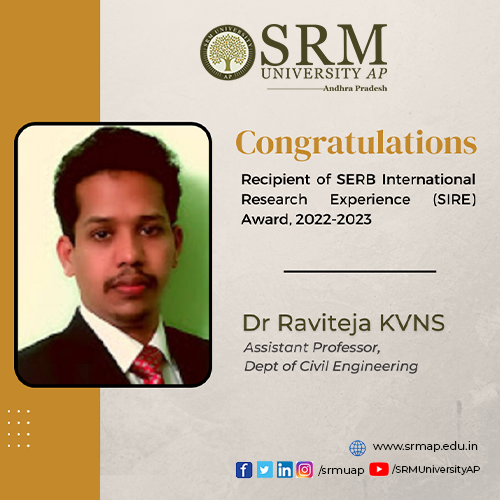Recent News
- Systematic bibliographic research on eutrophic-ecological models August 22, 2022

The Department of Civil Engineering is delighted to announce that Dr Siddhant Dash has published a paper titled “Systematic bibliographic research on eutrophication-based ecological modelling of aquatic ecosystems through the lens of science mapping” in the journal “Ecological Modelling” having an Impact Factor of 3.512. This research was conducted in collaboration with Prof Ajay S Kalamdhad from IIT Guwahati.

This research is a systematic approach on reviewing the published literature on eutrophic-ecological models developed worldwide and the methods associated with them. This provides critical insights into the status of the research domain, thereby providing a direction for the practising and future researchers to undertake a research career in this domain. It offers a more comprehensive and holistic approach to the critical review of the published literature, providing a deeper understanding to the researchers regarding the existing practices of developing eutrophication-based ecological models and the prospects lying ahead. His future research plans include understanding carbon and nutrient dynamics within an aquatic ecosystem.
Abstract of the Research
When water bodies receive surplus nutrients, especially nitrates and phosphates, these nutrients stimulate excessive plant growth (eutrophication), including harmful algal blooms, leading to oxygen depletion, decreased biodiversity, changes in species composition and dominance, and degradation of water quality. Although there are natural causes, much of the eutrophication today results from inadequately treated wastewater and agricultural runoffs. Population pressure, urbanization and industrialization contribute a considerable amount of waste, which alters the physio-chemical quality of water that eventually upsets the biotic components of the aquatic system. It is important to note that though pollution has been a significant factor in degrading the quality of aquatic ecosystems, the lack of management and global awareness regarding the protection and conservation of water bodies worldwide cannot be neglected. Hence, there lies an inherent sense of responsibility to restore the aquatic ecosystems to their natural state. Numerous techniques/treatment options are available for varying conditions, such as climatic factors, socio-economic factors, and so on. However, before ascertaining a treatment alternative to curb eutrophication levels, understanding the dynamics of any independent aquatic ecosystem is of prime importance. This necessitates a reliable model, which can provide information regarding the physical processes and dynamic occurrences in the eutrophic water bodies. Ecological modelling refers to the formation of dynamic and complex relationships between the organisms found in the ecosystem and the surrounding. It attempts to unravel the effects of certain relationships in the ecosystem that are not so apparent at first glance. The present study provides a scientific investigation of a detailed review of the published works in the domain of eutrophication-based ecological modelling till the year 2020. The first step was the scientometric studies, which were followed by a qualitative assessment wherein the current trends in research were discussed. This was followed by identifying the critical gaps in research to provide future direction.
Fig. 1. Ecological modelling process
Fig. 2. Description of the three-step literature review process employed in this research
Continue reading → - DST-SERB international research fellowship for Dr Raviteja May 20, 2022

SERB International Research Experience (SIRE) is a coveted opportunity for passionate researchers to collaborate with leading institutions across the globe for high-end research training in frontier areas of Science and Technology. Dr Raviteja from the Department of Civil Engineering has earned this opportunity through his resourceful project titled “Sustainable Ash based Geosynthetic Clay Liners for MSW Landfills”. The work proposes a sustainable design of solid waste landfill liners using industrial by-products like fly ash.
Municipal solid waste (MSW) landfills need to be lined at the bottom to avoid contaminant transport. The conveyance of noxious pollutants from the landfill to the natural ground can be restricted using natural or synthetic barriers. In general, natural materials like clays/bentonites in combination with geomembranes (GMB) are used in liners. However, to increase the strength properties and reduce the compressibility characteristics, bentonites are often mixed with sand. With the increased cost and scarcity of sand, there is a renewed interest among the researchers to identify an alternative material to replace sand proportion in compacted GCLs in MSW landfills. Among several materials, fly ash is proved to be a potential substitute for sand in landfill liners.
This experience will serve as an excellent opportunity to work at one of the world-renowned, state-of-the-art geoenvironmental laboratories at the University of Illinois Chicago. “I feel fortunate to collaborate with Prof. Krishna Reddy, one of the eminent researchers in the geoenvironmental research fraternity. My research at UIC would be on developing sustainable ash-based geosynthetic clay liners for MSW landfills. I also wish to pursue recent advances in this area and identify a framework for my future research”, said Dr Raviteja. The project will help him establish strong research collaborations with experts in the geotechnical labs at other US universities. He can also make field visits to identify the practical problems and direct his research toward the real-field applicability.
With an enriching research exposure at UIC, he will be able to formulate innovative and advanced research problems to enhance the visibility and applicability of his project. Presenting this work at various conferences and seminars will also attract various potential collaborations and MoU with other universities abroad. According to him, “this is a less explored domain that will immensely benefit research scholars and undergraduate students to invent new possibilities and scopes in the future”.

